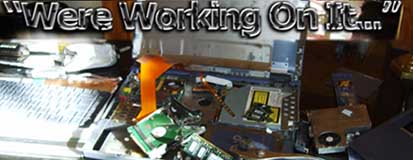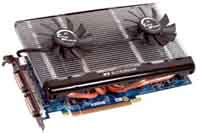Cleared CMOS, restored freqs to settings for old Athlon CPU, and now all's well, except I'm not enjoying the benefits of the faster CPU, as the system still "thinks" it's the old 1.2GHz Athlon.
My research shows that without flashing BIOS, what probably happened is that when I raised the CMOS values to accomodate the new CPU, it only half-worked, creating instability. I considered trying again in much smaller increments, but I think as long as the POST page is still showing the old CPU, I need to flash BIOS.
Trouble is, the file I DLd from Epox doesn't do the trick (and sadly, no flash program came with mobo). Got a "this BIOS image cannot be updated!" error message... waiting to hear from mfr. as to whether or not this was the right one...
Sry M8,
I've been out on a boat for nearly a week, (life's a beach!)
But you had it working at the correct frequency !
The motherboard DID recognise the CPU didn't it? I mean, you got the correct speeds running as you stated. Trying to update the bios was not needed yet, and dangerous as well, thankfully you didn't flash the board into oblivion.
The post shows the old cpu because you set the settings back to the old speed! No bios upgrade is gonna change that! If you set the CPU up to run at 2.0ghz again, see if the post ID's it as a SEMPRON 2400+, if it does, then you have BIOS support. (as long as all the other cpu parameters are correct usually).
You can usually tell if the BIOS supports your new cpu by the CPU ID at post, if it says Something like SEMPRON 2400+, it has BIOS CPU support for that cpu. This is known as string information and sometimes all that a BIOS upgrade actually does is provide new string information for newer CPU's, without ANY real upgrade support!
If the CPU is ID'd by a speed rating in ghz instead of the CPU string name, either the mainboard has no BIOS "string" info for that CPU, (no support), or the BIOS settings are not configured correctly (by the cpu defaults).
If the BIOS actually does support the CPU, it will only ID the correct string name if the BIOS is configured correctly for that CPU. If some setting does not match the CPU, even if BIOS support exists, it may not show the string name, or CPU ID correctly. Make sure you exhaust all possibilities before flashing the bios, or go to the mobo's website for info on bios upgrades and what they are for...... (makes a lot of sense! )
FS9 hanging may have been a software configuration problem or possibly another setting you altered in your bios by mistake, causing FS9 to hang through a video configuration problem.
If you can get back to where you were when you had the PC running at it's correct upgraded speed, try using other software to test the video capabilities before changing your system configuration.
Trashing the system config because FS9 hung was a bit premature in my opinion. Also, you set a NON-STANDARD bus speed when you altered it (150mhz) and this might have been causing your booting probs.
FS9 hung and caused the reset. So, did you try it again before you re-configured? FS9 prolly spat the dummy because it wasn't expecting a new CPU, backing up and removing the fd9.cfg file may have solved the prob, forcing fs9 to write a new cfg file with the "new" hardware.
Some of the software you have installed, like fs9, might glitch out for some reason as it was configured with the old hardware settings. I find this a little surprising, but not unlikely. Re-installing FS9 or doing the fs9.cfg removal should have worked. Instead, you went straight to the most dangerous procedure as far as mainboard's are concerned - BIOS flashing!
There are more dead mainboards due to incorrect bios flashing than you could imagine. People who advise bios flashing without warning of the dangers are a bit irresponsible or just ignorant of the facts. Be careful who you listen to, there's a mountain of dead hardware out there! Bios Flashing should be a last resort in most cases, and it should only be done after you have read the manufacturers readme on the bios upgrade and it's benefits, (such as whether or not it will offer new CPU support).
BIOS flashing requires the correct flash utility and bios file...... or IT WILL FAIL!
A power outage or spike during the flash may kill your mainboard as will a procedural error.
BIOS flashing is risky.
 I'm currently typing this post on a laptop... I have recovery floppies, but I'd like to know if there's another solution... unless I've trashed that mobo. Anybody have any ideas? Don't worry, I take full responsibility ;D
I'm currently typing this post on a laptop... I have recovery floppies, but I'd like to know if there's another solution... unless I've trashed that mobo. Anybody have any ideas? Don't worry, I take full responsibility ;D






 Mainboard: Asus P5K-Premium, CPU=Intel E6850 @ x8x450fsb 3.6ghz, RAM: 4gb PC8500 Team Dark, Video: NV8800GT, HDD: 2x1Tb Samsung F3 RAID-0 + 1Tb F3, PSU: Antec 550 Basiq, OS: Win7x64, Display: 24&
Mainboard: Asus P5K-Premium, CPU=Intel E6850 @ x8x450fsb 3.6ghz, RAM: 4gb PC8500 Team Dark, Video: NV8800GT, HDD: 2x1Tb Samsung F3 RAID-0 + 1Tb F3, PSU: Antec 550 Basiq, OS: Win7x64, Display: 24&

